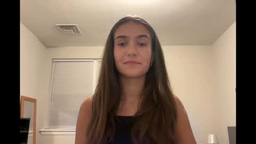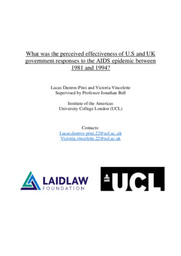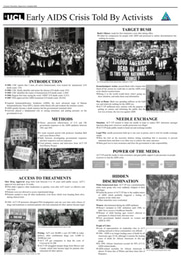My Laidlaw Experience
A first lesson I learned is how complex problems truly are. While I knew issues were not just black and white, I still believed there must be clear solutions if we thought about it enough. However, my Laidlaw experience taught me that even when a problem is clearly identified, finding a solution that does not cause some loss or that fully addresses all aspects of the issue is incredibly challenging. But my experience also taught me that despite this, each of us can still contribute to making a difference without knowing all the answers. It showed me that progress is often made through small, meaningful actions rather than waiting for one perfect grand solution.
For the research component of the program, I assisted Professor Jonathan Bell in investigating the early HIV/AIDS crisis in the United States. My task was to thematically analyze interviews of activists in AIDS Coalition to Unleash Power (ACT UP) who were on the front lines of protests, pushing the government to take action. This helped us understand the lived experiences of those with AIDS/HIV and allowed us to see the actual impact/shortcomings of policies. We could review official documents to see when policies were enacted, but the interviews showed us whether these policies were truly as effective as the government presented them to be. For instance, even when the government decriminalized needle exchange programs, it was still the activists who set up stations to actually implement them. The project also highlighted the importance of truly understanding the problem you are addressing. we saw how ineffective the government's policy solutions were as the government rarely engaged with people affected by HIV/AIDS. In contrast, the actions of activists, who were constantly engaging with the targeted people, turned out to be very effective. This showed me that to be a good leader, you need to understand and connect with the people you are leading.
Another important lesson I learned about leadership is that effective leaders are not always in traditional positions of power, nor do they intentionally take these roles as leaders. The people who formed ACT UP were not the heads of the CDC or FDA, they were just everyday people with a common goal, and yet they successfully led a movement that compelled government, organizations, and others to take huge actions. The nature of my research (watching activist interviews) taught me that you can find yourself in leadership roles without necessarily intending to. The key is to act and adapt. I learned the same lessons during my LIA, but by experiencing it rather than observing it.
For my LIA, I volunteered at a high school in Washington DC. I participated in a program aimed at preventing students from dropping out, which is one of the biggest issues DC public schools face. My role focused on academic support, where I conducted small group English classes for students who were not proficient in English and provided one-on-one or small group tutoring in math or French. At the beginning of this experience, I felt like I did a lot of waiting, like waiting to be told what to do or waiting for the kids to show me their motivation and enthusiasm. However, I quickly realized the need to be proactive, to observe and identify ways to help, and to try different techniques to engage the students. For instance, in the English classes, I tailored lessons based on themes that interested the class. This experience taught me the importance of adaptability in leadership. There is never a one-size-fits-all solution, so being able to adjust your approach to better suit the needs of the people you are helping is crucial.
Lastly, this experience allowed me to understand what the ACT UP activists went through when they unintentionally became leaders. Although the LIA stands for Leadership in Action, I initially saw myself as just an assistant to the “actual” leaders. However, as the students began to open up and engage more during our sessions, I realized that, to them, I was a leader. While this shift in perspective was both empowering and intimidating, it also made me reflect on my potential to lead in various aspects of my life and how to embrace my own capacity for leadership. Understanding that leadership can emerge in unexpected ways has taught me to be more proactive and confident.
The experiences and lessons I gained through Laidlaw have shaped my understanding of leadership and social change. Moving forward, I will actively engage with communities and issues I want to address, using research to understand problems and find solutions. I will be adaptable and tailor my approaches to the needs of those I aim to help. Most importantly, I will remember that leadership can arise unexpectedly, and each of us can make a meaningful difference even through small, genuine actions.



Please sign in
If you are a registered user on Laidlaw Scholars Network, please sign in